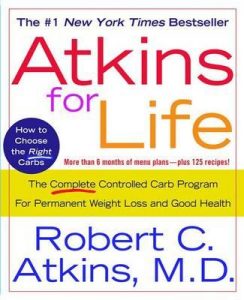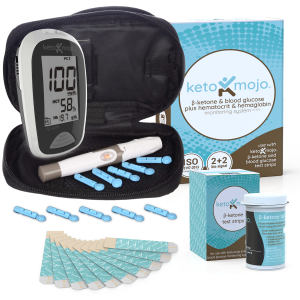Have you wondered if you could benefit from the ketogenic diet? This study about military personnel who tried it might just help you make that choice!
Why Use A Keto Diet?
Should You Keto?
 To Keto or not to Keto? That is the question. Keto was first popularized by Dr. Atkins in 1972. I was involved in writing his later books "Dr. Atkins New Diet Revolution" and "Atkins For Life".
To Keto or not to Keto? That is the question. Keto was first popularized by Dr. Atkins in 1972. I was involved in writing his later books "Dr. Atkins New Diet Revolution" and "Atkins For Life".
Today the Keto revolution has flourished and many folks have tried a Keto diet for weight loss.
So, should you Keto too?
Keto is a term describing a diet or group of foods and products that help the body produce ketones. When you eat limited amounts of carbohydrates; it triggers the liver to produce ketones and burn body fat as an energy source instead of glucose. You are then in a natural state of ketosis.
A Keto diet is a high-fat diet that contains 50 grams or less of carbohydrates a day. This means you cannot eat sugar, starch or most carbohydrates. The allowable carbohydrates are salad and non-starchy vegetables, whole-fat cheese, nuts and seeds, lemon or avocado.
A Keto diet is a metabolically corrective diet. Research has shown its safety and effectiveness for weight loss, anti-aging, sports performance, and for optimizing health.
Foods and products have been created to help people stay in ketosis. These Keto-friendly foods can help you maintain a healthy Keto lifestyle. However, if these commercially made products are over-consumed, they can be detrimental to eating balanced meals negatively affecting your goals.
Burning Ketones For Health
When you are in keto mode, the liver produces a healthy range of ketones based on your goal (1).
| Conditions | Ketone Range (mmol/L) |
| Weight & Fat Loss | 0.5-1.3 |
| Blood Sugar Management | 0.5-1.3 |
| Exercise Performance | 0.5-1.3 |
| Mental Clarity | 0.5-1.3 |
| Neurological Disease | 0.5-1.3 |
| Epilepsy | 3-6 |
| Cancer Focus on Blood Glucose | 3-4 |
| Cancer Focus on Ketones | 3-6 |
 Ketones can be measured with urine strips, breath meters, and blood strips. Blood ketones are the most accurate way to measure fat burning. Dr. Dominic D'agostino tweets, "The Keto Mojo Ketone Meter has proven its accuracy in measuring Ketones and glucose. It is also an affordable alternative ($1/strip) to Abbott's Precision Xtra and Freestyle Optimum Neo".
Ketones can be measured with urine strips, breath meters, and blood strips. Blood ketones are the most accurate way to measure fat burning. Dr. Dominic D'agostino tweets, "The Keto Mojo Ketone Meter has proven its accuracy in measuring Ketones and glucose. It is also an affordable alternative ($1/strip) to Abbott's Precision Xtra and Freestyle Optimum Neo".
If you follow a ketogenic diet and are not attaining high levels of ketones, do not fret. Ketones, like the scale, can be a deceptive tool. Ketosis is affected by hormones including high insulin levels, water intake, and certain medications. If you are sticking to a Keto plan it's possible to lose weight or manage blood sugar without registering ketones.
Keto For Good Health
A Ketogenic diet is a healthy eating plan. Although the Keto diet is an extremely popular weight loss diet, it offers many health benefits. In addition to feeling satisfied, when you eat keto, you experience lower risks for:
 Heart disease;
Heart disease;- High blood pressure;
- Low blood sugar;
- High blood sugar;
- Metabolic syndrome;
- Insulin disorders (such as polycystic ovarian syndrome, PCOS);
- Certain types of cancer;
- Alzheimer's disease;
- Epilepsy;
- Mood disorders;
- Thyroid;
- Yeast or candida overgrowth
- Bowel diseases;
- Reflux;
- Gas and Bloating;
- Fatty liver;
- Kidney disease;
- Kidney stones;
- Gout;
- Normalized blood sugar;
- Decrease inappetite;
- Reduced acne;
- Reduced heartburn;
- Migraines;
- Sleep disorders;
- Low Energy.
Plus, with a ketogenic diet, you can improve your ability to manage and reverse these health risks.
A Keto Diet Controls Type 1 & 2 Diabetes
 With Type 1 and 2 Diabetes, the main problem is the body’s ability to manage blood sugar levels. For people with Type 1 Insulin-Dependent Diabetes, insulin isn’t produced in the body.
With Type 1 and 2 Diabetes, the main problem is the body’s ability to manage blood sugar levels. For people with Type 1 Insulin-Dependent Diabetes, insulin isn’t produced in the body.
In the past, it was controversial to use a ketogenic diet because of the risk of ketoacidosis (KA). KA is excessively high and dangerous levels of ketones that build-up in the blood; it can lead to death. However, Dr. Richard Bernstein lives a healthy lifestyle with Type 1 Diabetes while following a keto diet, Dr. Bernstein's Diabetes Solution2.
The reason a Ketogenic is better to control blood sugar for type 1 diabetes is due to the variability of the absorption of carbohydrates and insulin.
Read More: Keto and Type 1 Diabetes
The keto diet can significantly improve the quality of life of those who live with Type 1 Diabetes as long as you work with a knowledgeable healthcare professional and blood sugar and ketones are monitored carefully and aggressively.
When your body produces too much insulin you will struggle with hunger, weight issues, and Type 2 Diabetes. Additionally, when the cells are resistant to insulin (insulin resistance), they can cause high blood sugar. These excess carbohydrates in your blood can be deadly. Because there are very few carbs on a keto diet, the body is not being challenged and blood sugar normalizes3.
A Keto Diet Helps Treat Polycystic Ovary Syndrome (PCOS)
PCOS is a common problem caused by hormonal imbalance and high insulin levels in women. It effects one in eight women of child-bearing age. Women with PCOS may notice these symptoms; irregular menstrual cycles, facial hair, skin tags, and weight gain, darkening of the skin, acne, and thinning hair4.
Eating carbohydrates raise insulin levels. High insulin levels contributes to worsening PCOS symptoms. With a Keto diet, insulin levels are lowered.
A 2005 scientific study shows the effects of ketogenic diet on 11 women diagnosed with PCOS. These women were asked to limit their carb intake to less than 20 grams per day for 24 weeks. The results showed that a keto diet is very effective in reversing hormonal issues and high sugar levels in PCOS women. Two women even became pregnant despite having a history of infertility5.
A Keto Diet Fights Epilepsy Better Than Drugs
 In a study, measuring the effects of a keto diet in 150 children with epilepsy, researchers found very promising results. The quality of life of these children significantly improved. Twenty were completely cured. Twenty-one reported 90% fewer seizures. The remaining volunteers were able to lower or live without the need for medication. The researchers concluded that the Keto diet is more effective than any anti-epileptic drugs currently on the market6.
In a study, measuring the effects of a keto diet in 150 children with epilepsy, researchers found very promising results. The quality of life of these children significantly improved. Twenty were completely cured. Twenty-one reported 90% fewer seizures. The remaining volunteers were able to lower or live without the need for medication. The researchers concluded that the Keto diet is more effective than any anti-epileptic drugs currently on the market6.
A Keto Diet Limits Cancer Cell Growth
Some cancer cells use glucose as the main energy source to grow and multiply. For these types of cancers, a strict keto diet is deadly as the diet cuts off the ability of the cancer to use glucose as a means to thrive and grow. In this instance a ketogenic diet can be life-saving for the patient7.
A Keto Diet Lowers Risk of Heart Disease
We grew up believing that fats clog our arteries and contribute to heart disease. But recent research has proven otherwise. Carbohydrates elevate triglycerides. Healthy natural fats reduce cholesterol risk. In a six month study, a keto diet lowered triglycerides, LDL cholesterol, glucose and raised HDL cholesterol. Lowering these heart disease risk factors supports the use of a keto diet for heart disease8.
Keto Wrap-Up
Do you suffer from any of the conditions above? Excess carbohydrate consumption triggers hormones and fats that negatively affect health. Going Keto can help you lose weight and improve your health. It is so effective, please speak with your doctor to help manage lowering medications as necessary.
If you interested in learning more search my blog or schedule a personal or group appointment today.
References
- https://ketosummit.com/optimal-ketone-levels-for-ketogenic-diet
- https://www.ncbi.nlm.nih.gov/pubmed/25287761
- https://www.amazon.com/s/?ie=UTF8&keywords=dr+bernstein%27s+diabetes+solution&tag=mh0b-20&index=aps&hvadid=78546416270488&hvqmt=e&hvbmt=be&hvdev=c&ref=pd_sl_96ovk0mrfl_e
- https://www.womenshealth.gov/a-z-topics/polycystic-ovary-syndrome
- https://nutritionandmetabolism.biomedcentral.com/articles/10.1186/1743-7075-2-35
- https://www.ncbi.nlm.nih.gov/pmc/articles/PMC4215472/
- http://pediatrics.aappublications.org/content/108/4/898?download=true
- https://www.ncbi.nlm.nih.gov/pmc/articles/PMC5110522/
Related Articles
Prostate Cancer Crushed With Keto Diet
Prevalence of Prostate Cancer According to The American Cancer Society, prostate cancer is the second most common cancer affecting men. Skin cancer is number one. While prostate cancer is typically not deadly for the 165,000 men...
4 Weight Loss Vitamin Supplements
Weight loss vitamin supplements can boost the effects of diet and exercise. Adding natural nutritional supplements to a weight loss strategy can help curb appetite and facilitate weight loss. If your rate of weight...
Secret Nutrition Tip For Weight Loss
I will share a secret nutrition tip for weight loss to help you shape up and strip down for the summer.
Eat This Best Food To Lower Cholesterol
The debate over egg yolks and heart health risk needs to end now. In fact, the egg yolk may just be one of the best foods to lower cholesterol. While it is true eggs are a high in cholesterol, they may just be the best food to...
Keto Diet Resources
Is A Ketogenic Diet For You? Is a keto diet for you? If you seek diet information, you’ll find it everywhere. Diet-related topics are plastered all over the media. On a daily basis, there’s information on what to eat...
Type 1 Diabetes Diet & Management Tips
Achieve normal blood sugar, emotional stability and mental clarity using a ketogenic diet and personalized self blood sugar monitoring.
The Pre-Diabetes Truth
Pre-diabetes is NOT a mild form of diabetes. It is both its own medical condition and the second stage of five diabetes stages. Learn why normal blood sugar is important for pre-diabetes.
Catch High Blood Sugar Symptoms Early: 30 Tell-Tale Signs
No matter who you are, no matter how much you weigh and REGARDLESS of your family history, be aware of the 30 tell tale high blood sugar symptoms.
The Best Diet for High Blood Sugar
Which foods make up the best diet for high blood sugar? You may be very surprised to learn how delicious eating can be.











